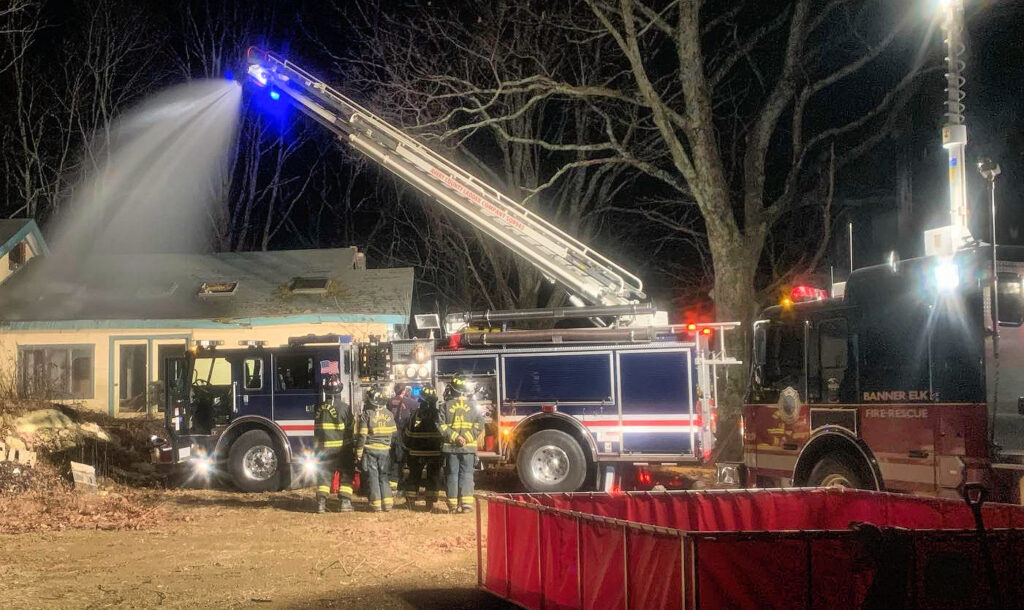
In 2021, North Carolina had 133 fire deaths reported with only 3 out of every 5 homes, having working smoke alarms. Here are some tips for preventing fire and injury in your home in Avery County.
Cooking
- Cooking is the leading cause of home fires and fire injuries in the US.
- Stay in the kitchen when frying, grilling, or broiling food.
- Set a timer to remind you of cooking times.
- Keep anything that can catch fire away from your stovetop.
- Ensure a 3-foot, kid-free zone around your cooking area.
- Turn pot handles away from the stove’s edge and use the back burners when possible.
- When cooking, wear short, close-fitting or tightly rolled sleeves.
- If you have a fire in your microwave, turn it off immediately and keep the door closed.
- Small grease fires should be extinguished by smothering the flames,
- For oven fires, turn off the oven and leave the door closed.
- Do not cook if you are sleepy, have taken medication, drugs, or consumed alcohol.
- Plug the microwave directly into an outlet and do not use an extension cord that can overload the circuit.
- If your clothes do catch fire, stop, drop, and roll!
Grilling Tips
- Only use grills outdoors, away from siding and deck railings.
- Clean grills often and remove grease and/or fat build-up.
- Make sure your gas grill lid is open before lighting.
- Have a 3-foot safe-zone around grills and campfires.
- Keep kids and pets away from the grilling area.
- Dispose of coals after they have cooled in a metal can.
- Never leave grills, fire pits and/or patio torches unattended.
Turkey Fryers
- Turkey fryer fires cause an average of 5 deaths, 60 injuries and more than $15 million in property damage each year.
- Hot oil can spill or splash onto the flame, igniting a fire.
- Fryers designed for outdoor use with or without a stand are prone to collapse.
- Cooking oil, if heated beyond its cooking temperature (375°), can ignite.
- Oil inside a turkey cooker pot, can stay dangerously hot for hours after use.
- Turkey fryers should not be used under a garage, deck, breezeway, porch, barn or any structure that can catch fire.
- Frozen, or partially frozen turkeys, will cause hot oil to splatter or produce hot steam, which leads to burns.
- NEVER use water to extinguish a grease fire!
Christmas Tree Safety
- Make sure the tree is fresh; the trunk should be sticky to the touch and branches should not easily snap when you bend them.
- Shake the tree and make sure many loose needles do not fall off as a result.
- Before bringing your tree indoors, make a 1/2″ to 1″ fresh cut on the bottom of trunk and let it stand in a bucket of water outside for 12 hours before bringing indoors and placing in its stand.
- Check the water in the tree stand daily. Make sure the tree isn’t blocking any exits and keep it at least three feet away from heat vents or other heat sources.
- Artificial trees should be labeled, certified or identified by the manufacturer as fire-retardant.
- Use lights that have the label of an independent testing laboratory.
- Make sure all decorations are flame-retardant or flame-resistant.
- Do not overload extension cords and electrical outlets.
- Replace any string of lights with worn or broken cords, or loose bulb connections.
- Connect no more than 3 strands of mini-string lights together at one time.
- Never use lit candles to decorate the tree.
- Always turn off Christmas tree lights before leaving the home or going to bed.
- Dried-out trees are a fire hazard and should not be left in the home or placed outside the home.
Smoke Alarms
- Working smoke alarms decrease the chances of dying in a home fire by 55%. Families have an average of 2 minutes to get out of their homes once the smoke alarm sounds. 134 fire deaths occurred across North Carolina in 2021, and many of those homes did not have working smoke alarms.
- Place a smoke alarm on every level of your home outside sleeping areas. If bedroom doors are kept shut, place a smoke alarm in each bedroom.
- Teach children what a smoke alarm sounds like and what to do when they hear it.
- Prepare and practice an escape plan – know at least two ways to get out of a room, crawl low under smoke and plan where to meet outside.
- Keep smoke alarms clean by regularly vacuuming over and around it. Dust and debris can interfere with the smoke alarms operation.
- Install smoke alarms away from windows, doors, or ducts that can interfere with proper operation.
- Never remove the battery from or disable a smoke alarm. If your smoke alarm is sounding “nuisance alarms,” try moving it away from kitchens or bathrooms.
- Replace all smoke alarms when they are 10 years old.
Home Fire Escape Plan
- Review your escape plan with everyone that stays in the house, including children.
- Test the smoke alarm, monthly.
- Practice crawling low beneath the smoke.
- Remember to check doors for heat with your hand; if a door is hot, do not open it.
- Close the doors as you leave.
- Practice with a collapsible ladder if you have one.
- Go directly to your meeting place; do not stop to find your pets or valuables.
- Remember to get out and stay out.
- Practice your plan at least twice a year.
Find more information from the North Carolina Office of the State Fire Marshal.